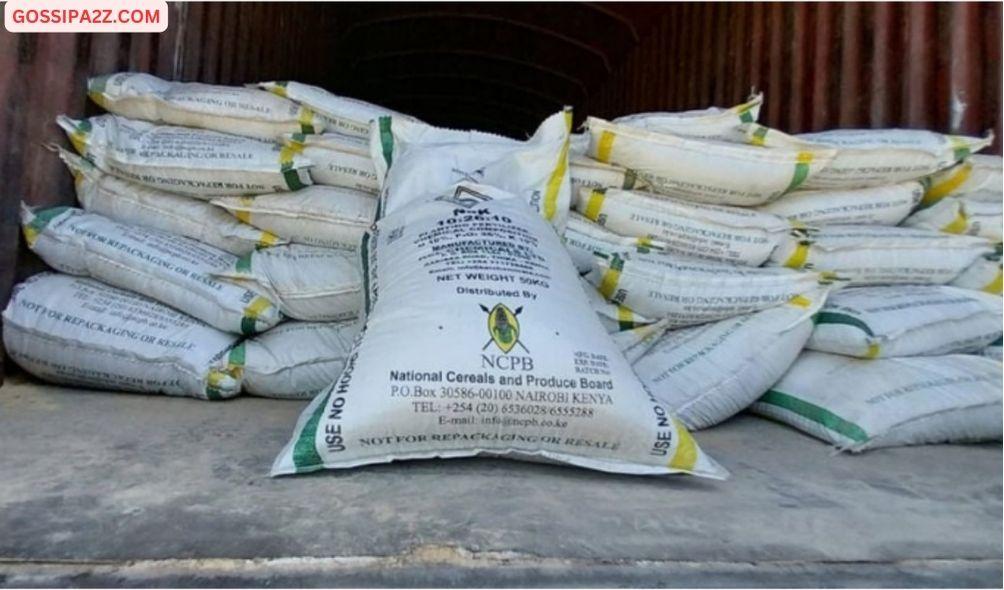Fertilizer Fiasco: Government’s Doublespeak Leaves Truth Uncertain
As the controversy surrounding counterfeit fertilizers unfolds, numerous queries linger without resolution, while various organizations and governmental bodies strive to clarify the situation and justify the identified discrepancies.
The issue gained prominence due to a documentary called “Fertile Deception” produced by African Uncensored. This documentary revealed the extensive distribution of fake government fertilizers throughout the nation, posing a threat to food security.
This occurred amid a string of confiscations by officials, leading Agriculture Cabinet Secretary (CS) Mithika Linturi to deny allegations of fake subsidized fertilizer distributed by the state.
Linturi claimed that the fertilizers distributed to Kenyan farmers by the government undergo rigorous scientific testing and approval processes before being made available.
The subsequent action entailed the National Cereals and Produce Board (NCPB) suspending the production of NPK 10:26:10 fertilizers by Ken Chemicals Limited due to its failure to meet the necessary standards.
KEL Chemicals faced consequences when their fertilizers, namely Kelphos Plus, Kelphos Gold, and NPK 10:26:10, failed to meet the necessary standards set by the Kenya Bureau of Standards (KEBS), resulting in their discontinuation.
SBL Innovate Manufacturers Limited, another company, came under investigation when the Directorate of Criminal Investigations (DCI) requested its director, Josiah Kimani Kariuki, to respond to questions regarding the fertilizer issue.
As the scandal unfolds, farmers are facing the consequences, with conflicting statements from leaders, including President William Ruto, adding to the confusion surrounding the fertilizer issue.
It is not fake!
Linturi has consistently stated that counterfeit fertilizer does not exist and firmly expressed this conviction during his appearance before the National Assembly Agriculture Committee on Monday.
“We do not have fertilizer that you would say is fake. What KEL failed is the standard set out in the Kenyan market that has a deficiency of plus or minus 3,” he said.
“Whatever figures you hear out there from anyone with the contempt that they deserve. The true position of the number of bags of fertilizer of the batch that did not meet the standard is 3,000 bags.”
However, according to Deputy Rigathi Gachagua’s memory, the figure is significantly higher.
During his encounter with the Kenyan Diaspora in Kigali, Rwanda, Gachagua criticized the issue, highlighting that Kenya had brought in more than 4 million bags, yet only 50,000 were affected due to a dishonest supplier.
President Ruto, speaking to a gathering in West Pokot on Monday, asserted his involvement in addressing the debacle, acknowledging the presence of counterfeit fertilizers and pledging to take necessary measures against those responsible.
“There is one company called KEL…If there is any farmer who has bought the wrong fertilizer they should be compensated and get another one free of charge,” said Ruto.
“Every farmer will get the correct fertilizer and those few individuals who want to sabotage food production.”
The ‘black-and-white’ evidence
John Kanyuithia, the chairperson of the Agriculture Committee in the National Assembly, has stated that two Kenyan companies, namely KEL Chemicals and SBL Innovate, have introduced fertilizers of substandard quality into the market.
“The one by SBL Innovate is not a subsidy fertilizer it may be following the channel which the subsidy fertilizer is following but it is not a subsidy,” he said speaking to Citizen TV on Tuesday.
He additionally mentioned that the fertilizer was marketed as organic, however, the committee discovered that it was also being sold under the label of a “conditioner.”
“A conditioner moderates the situation of the soil and does not necessarily add any nutritional value. Organic fertilizer comes in to try and modify the soil if it has a high leaching capacity and traps the water around the crop to help it to grow.”
According to Kanyiuthia, the organic fertilizer was first submitted to KEBS for approval, and it received the quality certification.
ALSO READ:
- “Two Groups, One Agenda”: Gachagua Accuses Raila of Secret Political Deals
- Exclusive: Ida Odinga’s 75th Birthday Party in Karen (Photos)
- FKF President Discloses Exact Amount Paid to Harambee Stars Players
- Gachagua’s Ally Senator John Methu Admits Ruto Might Win 2027 Elections
- Maraga Explains Why He Hasn’t Campaigned in Kisii Despite 2027 Bid
It’s also reported that SBL Innovate proceeded to distribute diatomite to farmers through the National Cereals and Produce Board (NCPB) system, packaging it under the names 51 Capital and Africa Diatomite Limited.
“That is fraudulence, diatomite does not have any sufficient nutritional value, it has very little organic matter and no major elements that are required. Even as a conditioner, it has a little bit of lime but it doesn’t have sufficient lime to bring up the PH to neutral. It is fake,” he noted.
KEL Chemicals discovered that three fertilizers were removed from their production line due to inadequate levels of essential elements required in fertilizers, namely Nitrogen, phosphorus, and Potassium (NPK).
“When you see Kelphos, it is a Kel fertilizer that has phosphorous,” he said.
Farmers who bought counterfeit fertilizers are encouraged to visit the NCPB outlets where they made their purchases to receive compensation.
Meanwhile, further investigations are underway.
Fertilizer Fiasco: Government’s Doublespeak Leaves Truth Uncertain
